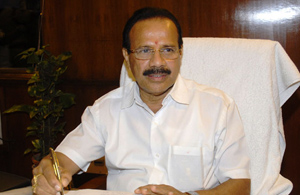New Delhi, Sep 16: The government wants to enact a comprehensive bail law that clearly sets out conditions for grant of relief to end the discretion of courts and quell the perception that the existing system is "inextricably linked to the financial well-being of the accused".
"All is not well with the way cases relating to grant of bail are being handled. While those with resources are able to secure relief, the poorer lot languish in jails," Law Minister D V Sadananda Gowda has said in an internal note to Law Secretary.
Gowda has suggested the need for examining the desirability of having a separate Bail Act uder a "major revamp" of the bail system.
The minister said bail should be granted as a matter of right and be denied only when there is a fear that the accused can tamper with the evidence, influence witnesses or commit more crimes while out of jail.
"However, in practice it does not happen for various reasons, like delay in hearing bail applications due to heavy workload in the courts, the cumbersome procedure adopted for hearing and deciding bail applications, the accused not being able to produce sureties as well as lack of awareness among the underprivileged and marginalised sections of the society," he said.
Law Secretary P K Malhotra has referred the matter to the Law Commission, which advises the government on complex legal issues, and asked it to submit a report within six months.
The move comes on the heels of a controversy over bail to actor Salman Khan. The Bombay High Court had in May suspended his 5-year sentence in the 2002 hit-and-run case and granted him bail pending his appeal against conviction.
This had triggered a debate on how influential people manage to secure bail but the poor continue to languish in jail.
In his note, Gowda said though the judiciary adopts a very elaborate procedure to deal with matters related to grant of bail, "still the system has the general perception among people that grant or denial is highly unpredictable...the bail system is linked inextricably to property and financial well-being of the accused, meaning thereby that accused persons with means."
Noting that there is "growing dissatisfaction" about the system of grant of bail, he said though it is a uniform and reasonable provision in theory, "in practice it does not prove to be so."
Noting that the occupancy in Indian prisons has been reported to be consisting of 1/3rd of convicts and 2/3rd of undertrials, he said "it is a sad state of affairs."
"If the right of bail is denied to the accused, it would mean that though he is presumed to be innocent till the guilt is proved beyond reasonable doubt, yet he would be subjected to the psychological and physical deprivation in jail," he said.
Under the existing law, several sections of the Code of Criminal Procedure deal with grant of bail but discretionary power is finally vested in courts.





Comments
Add new comment